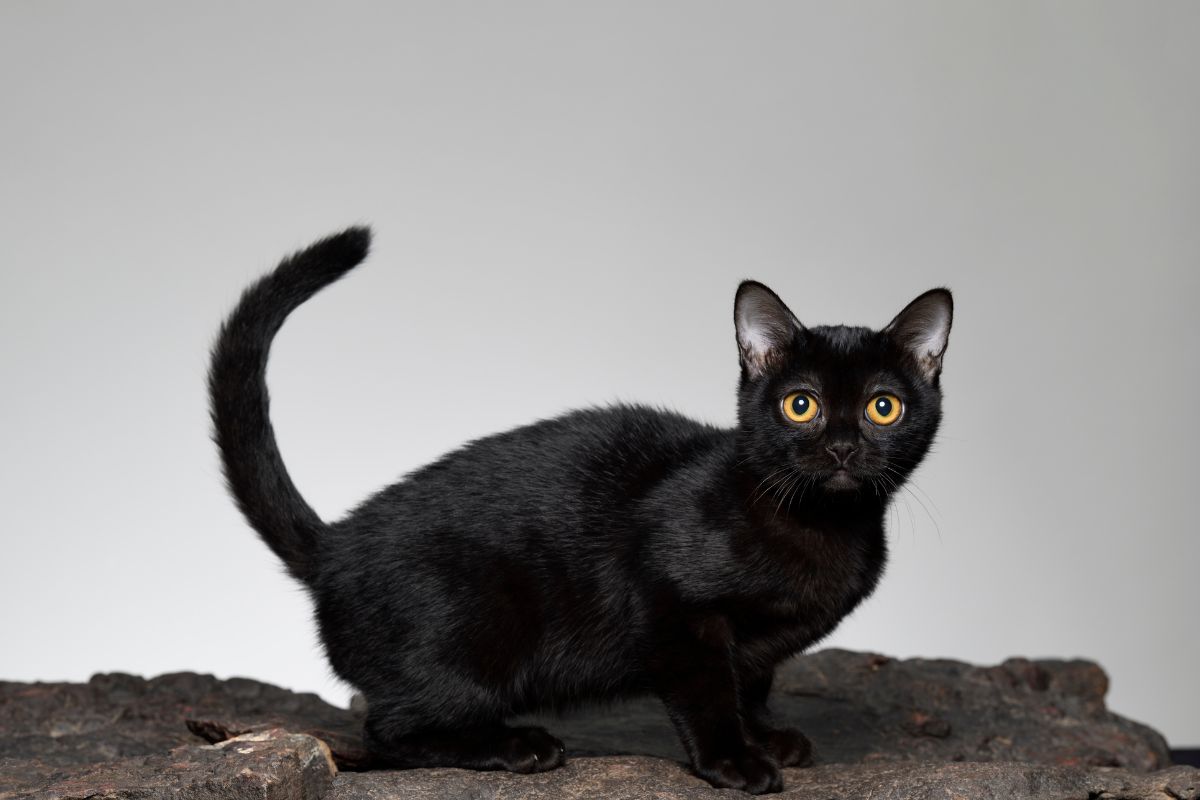The Bombay cat is a sturdy feline with jet-black fur and captivating golden eyes. Often likened to miniature panthers, these cats will make you fall in love with their striking appearance and endearing personalities. These are hybrid cats, a mix of the American shorthair and the Burmese breeds, who are sociable and friendly.
In this article, we’ll provide an in-depth understanding of Bombay cats. We’ll cover every topic, from their characteristics and history to living with and caring for them. We’ll help you get to know them better and raise them successfully. Let’s start.
Breed Overview of Bombay Cats
- Personality: Affectionate, friendly, clingy, playful
- Weight: Up to 15 pounds
- Length: Up to 20 inches
- Coat length: Short hair
- Coat colors: Black
- Coat patterns: Solid
- Eye Color: Copper or gold
- Lifespan: Up to 20 years
- Hypoallergenic: No
- Origin: USA
The Bombay is a medium-sized cat. In sight, they seem light but are considerably heavier than they appear. The feline breed is stocky and somewhat compact. Yet, they are very muscular with heavy boning. Bombay is also round all over. The head, tips of the ears, eyes, chin, and even the feet are round. Bombay has a characteristic walk. Their body appears almost to sway when walking.
Characteristics of the Bombay Cat
In general, we consider cats to be independent. Yet, Bombay cats are not any other cats. Bombays make lovely pets. They thrive on human company and even venture into Velcro cat territory. They are outgoing, intelligent, and friendly. They will get along well with family, other pets, and friends.
Younger Bombays are active, curious felines and adapt very quickly to change. At any age, they adore looking at the world around them. These adorable cats love to hang out by the window and eagerly observe.
Moreover, Bombay is well known for jumping on a person’s lap and spreading their beautiful body across the newspaper one is reading. Isn’t it sweet?
History of the Bombay Cat
Bombay was developed by Nikki Horner, a veteran U.S. cat breeder. In 1953, she sought to create a cat breed that looked like a miniature panther. Although it took her many years, the thorough, planned breedings of American short hair and Burmese cats eventually resulted in the midnight black, muscular Burmese. Horner chose Bombay as a nod to India’s storied black leopard.
The Bombay inherited numerous traits from its two founding breeds. Their body is alike to the Burmese, but is slightly longer and less compact. It’s also curious and friendly, like the Burmese. Their charming personality is credited to their American short hair ancestry.
Living With a Bombay Cat
Living with a Bombay cat is a rewarding experience. You will be gifted affection, companionship, and playful antics. These sleek, black-coated felines are known for their social nature and strong bonds with their human families.
The Bombay cat is a very solid cat, both in looks and feel, and one with great strength. They are impressive climbers and jumpers and should have cat trees and perches. They are also sturdy and stocky cats. You might have to watch their nutrition carefully to prevent obesity, especially if they don’t get enough exercise.
While adult Bombays are placid, they also tend to be very kittenish. They love being adored by their parents, having their stomachs rubbed, and being petted. They love their playing and petting sessions.
Bombay Cat Care
Grooming
The Bombay’s short, fine, satiny coat is easy to groom. Simply brush this cat’s fur weekly or rub it with a soft chamois cloth. In doing both, you bring out the coat’s patent leather shine.
Bombay is a very clean feline who sheds very little. Occasional baths maintain the coat for looking and feeling soft and glossy. For their nails, trim them every two weeks or so. Peek inside your Bombay’s ears every week or two to ensure they are not excessively dirty. Only clean your feline’s ears if necessary to avoid disturbing their naturally healthy bacterial balance.
Exercise
We have now established that Bombay is playful and curious. Bombay kittens have seemingly everlasting amounts of energy. Truthfully, they become more mellow as they age and are happy to reside on your left after a short bout of play and exploration. Bombay cats are smart, so they love puzzle toys. They are motivated to physically manipulate devices to get treats or food. These cats can also be trained and sometimes behave a little like dogs. Some enjoy playing fetch and walking on a leash. Moreover, they love to scratch. Ensure to offer your Bombay a variety of acceptable surfaces for scratching
Diet and Nutrition
Obesity is a concern for all cats. Bombay has a stocky build. For this reason, they are vulnerable to weight gain. Staying lean will help them prevent weight-related health issues like diabetes, arthritis, and heart disease. Free feeding is a no-no. It can lead to too much snacking and weight gain. Instead, adult cats should be served measured amounts of food twice daily. Kittens must eat three to four smaller meals every day.
Feed your Bombay a high-quality, balanced diet that meets their nutritional needs. Search for cat food that lists meat as their first ingredient. Also, ensure your feline has access to fresh, clean water at all times. Consider a water fountain to encourage drinking.

Frequently Asked Questions About Bombay Cat
1. Why are Bombay cats so special?
Bombay cats are often considered special for several reasons:
- Unique appearance: Bombay cats have a sleek, jet-black coat. This gives them a striking and elegant appearance. Their eyes are a vivid copper or gold, which stands out against their dark fur.
- Affectionate: Bombay cats are known for their loving and affectionate nature.
- Low maintenance: Their short coats demand minimal grooming.
2. How rare is a Bombay cat?
According to cat registries such as The International Cat Association (TICA) and Cat Fanciers’ Association (CFA), Bombays are registered in lower numbers than more common breeds. Bombay cats do not have the same level of mainstream popularity as Siamese or Persian cats, which contributes to their rarity.
3. Are Bombay cats expensive?
The price of a Bombay kitten from a reputable breeder usually stands between $500 to $2000. It will anchor on factors such as pedigree and bloodline and show potential. If you plan to adopt from a rescue or shelter, the fees can be significantly lower, typically around $100 to $300. Yet, Bombays are rare in shelters.
4. Are Bombay cats clingy?
Yes. Bombay cats are often considered clingy or highly affectionate. These felines can form strong bonds with their human families. They are known for their loyalty and affection.
Owning a Bombay means welcoming a devoted and playful companion into your home. Not to mention, you’ll also adore its striking appearance. If you’re considering adopting or buying one or a new owner of a Bombay, we hope this blog provides valuable insights along practical tips to enhance your experience.

